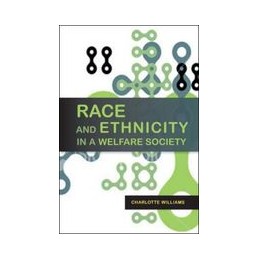- Reduced price

Order to parcel locker

easy pay


 Delivery policy
Delivery policy
Choose Paczkomat Inpost, Orlen Paczka, DHL, DPD or Poczta Polska. Click for more details
 Security policy
Security policy
Pay with a quick bank transfer, payment card or cash on delivery. Click for more details
 Return policy
Return policy
If you are a consumer, you can return the goods within 14 days. Click for more details
Government Ministers and advisers tell us that the race agenda is finished. Williams and Johnson, in this closely argued, wide-ranging and excellent book, remind us how far that statement is from the truth... This book must be read by all concerned with advancing racial equality.
Gary Craig, Professor of Community Development and Social Justice, University of Durham, UK
Williams and Johnson have presented a brilliant and comprehensive critique of the welfare states failure to respond to cultural diversity and make full use of its creative potential. Their analysis is equipped with considerable theoretical acumen and command of empirical data, and it goes on to lay the foundation of an egalitarian and multi-culturally orientated welfare society. This new text is a most welcome contribution to this complex area, and provides a suitable 10-year follow-up to the Runnymede Trust Commission on multicultural Britain, which I had the honour to Chair.
Professor Lord Bhikhu Parekh
I very much welcome this excellently timed book which drops right into the current debates. The double whammy of financial hardship and cuts to public services and benefits, threaten a brutal impact on poor and Black and Minority Ethnic communities. Race Equality campaigners and activists are increasingly concerned to highlight the importance of an approach to welfare that is caring, fair and where the recognition of race is integral. To provide equality, differentials of race, gender and class in particular must be considered. Those considerations are central to this book and it should be used as the underpinning narrative and rationale for making the case for race sensitive welfare.
Karen Chouhan, Director, Equanomics UK
The arguments in this book are compelling and provide a powerful case for race equality in the light of the Coalition government plans in reducing the size of the public sector and the welfare state in a clear ideological and fiduciary battle with public expenditure.
Patrick Vernon, Chief Executive of The Afiya Trust
Contemporary multiculturalism poses a number of challenges for the design and delivery of welfare services in Britain. This thought-provoking book explores the needs and well-being of ethnic minorities within the context of the changing framework for delivering welfare services. The book::
Race and Ethnicity in a Welfare Society will appeal to students of social work, social policy and sociology and to practitioners with an interest in welfare policy and practice.
Data sheet
Part Two The Mixed Economy of Welfare:
The Black voluntary sector
Informal Care and Carers support
The Privatization of welfare
Rural communities
Part Three Responding to Diversity: Future Agendas:
Black and minority ethnic workers in health and welfare services
Professionalism and cultural competence
Towards a multicultural welfare
